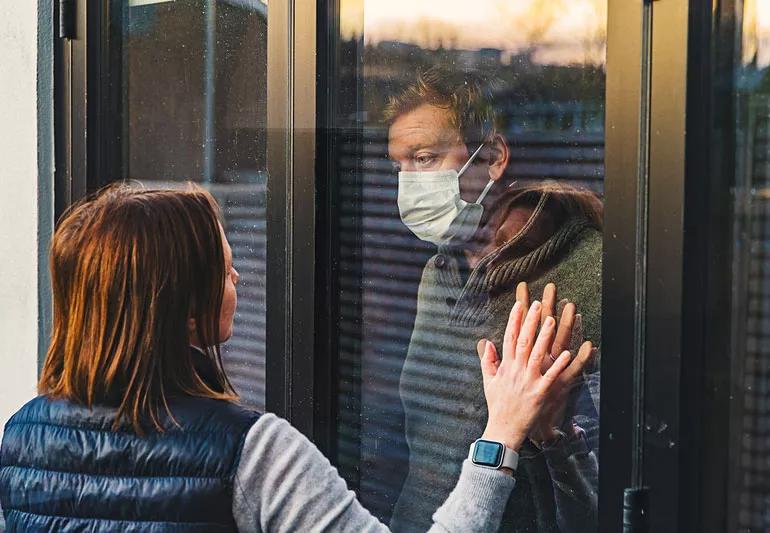Be mindful of signs of depression when you’re isolating

It’s normal to feel anxiety, worry and grief any time you’re diagnosed with a medical condition – and that’s certainly true if you test positive for COVID-19, or are presumed to be positive.
Advertisement
Cleveland Clinic is a non-profit academic medical center. Advertising on our site helps support our mission. We do not endorse non-Cleveland Clinic products or services. Policy
If your symptoms aren’t severe and you can recover at home, this will involve home isolation until it’s safe for you to be near others without potentially spreading the infection.
Isolation protects others from getting sick – but for the person who is sick, it might seem like one more thing on top of an already stressful situation.
“Being sick is not only hard on your physical well being but it can also significantly impact your mental health. Recovering from an illness can trigger stress, anxiety and depression which slow down your recovery processes. Tending to your emotional health during this time is key,” says psychologist Susan Albers, PsyD.
Here are some ways to keep anxiety and sadness from creeping in while you recover from COVID-19:
You may not know how you got infected, or how long it will take to recover. Instead of focusing your energy on regret or what ifs, double down on what you can do. Your job now is to take care of yourself, get well and avoid spreading the infection to anyone else.
Ask loved ones to check in on you regularly via phone, email or video chat. Talk to them about how you’re feeling. If you’re worried about taking care of children, pets or household duties while you’re sick, identify family members, friends or members of your community who aren’t part of a high-risk population and may be able to help.
Advertisement
Feed your body nutritious food (over comfort food) when your appetite allows, and stay hydrated. If you’re able, take deep breaths, meditate or stretch to help relax your body.
Keep yourself distracted to help prevent worry, ruminating or catastrophizing. Read a book, watch a show, do a puzzle. Many people find it difficult to focus on tasks while ill. Try calming music. It can help you to relax and distract your mind, Dr. Albers says.
Give yourself permission to just rest. You don’t have to do or achieve anything besides taking care of yourself. Now isn’t the time to stay up till 3 a.m. binge watching a new show.
All the chatter online can make you feel even more upset and overwhelmed. “Slow down the scroll of your social media feed or simply put it aside. Viewing what other people are doing 24/7 can make you feel like you are missing out or depressed about your situation. Remember that this will pass,” Dr. Albers says.
Being socially isolated can increase your risk of depression and anxiety. While you recover, watch out for these common red flags:
Dr. Albers notes that many behavioral health professionals are still seeing patients virtually, so if you can’t seem to control your negative thoughts, or experience any of these signs for more than two weeks, ask your healthcare provider to refer you to someone.
Advertisement

Sign up for our Health Essentials emails for expert guidance on nutrition, fitness, sleep, skin care and more.
Learn more about our editorial process.
Advertisement

Chilblain-like skin lesions and rashes are mild (and rare) complications of many viral infections, not just COVID-19

Most can return to work or school when they’re symptom-free for 24 hours

Covering your mouth when you cough and staying home when you’re sick are a couple ways to help keep yourself and others COVID-free

This vital nutrient supports your health, but its role in COVID-19 prevention and treatment isn’t proven

Studies have shown promising results, but additional research is needed

Infection and inflammation can cause you to lose your voice and have other voice changes until you’re fully healed

A COVID-19 infection can bring on depression or anxiety months after physical symptoms go away

Just like the flu, COVID-19 continues to evolve every year with new and smarter variants

Even small moments of time outdoors can help reduce stress, boost mood and restore a sense of calm

A correct prescription helps your eyes see clearly — but as natural changes occur, you may need stronger or different eyeglasses

Both are medical emergencies, but they are very distinct events with different causes